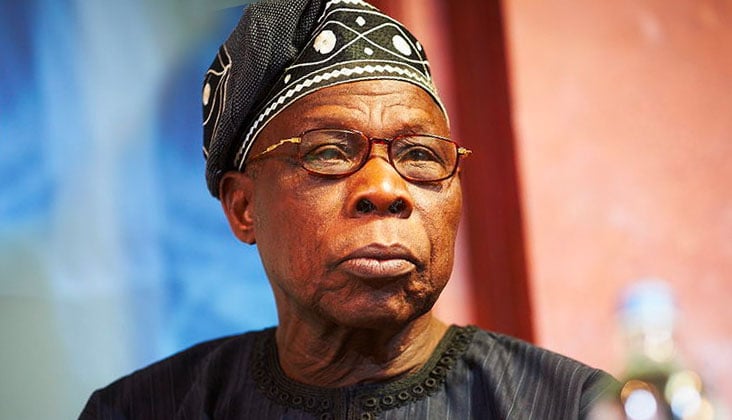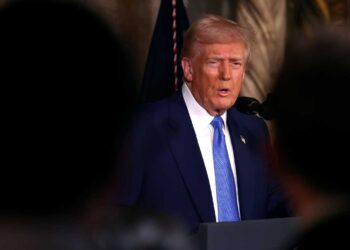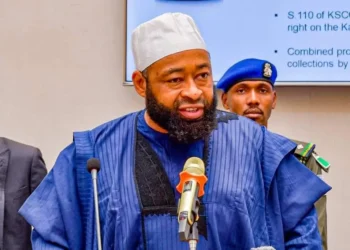Ex-President Criticizes Wage Policy, Alleges Bribery and Political Ambitions in Labour Unions
Former President Olusegun Obasanjo has openly condemned the new minimum wage of N70,000 approved by President Bola Ahmed Tinubu, arguing that the figure is grossly inadequate to meet the basic needs of Nigerian workers.
Obasanjo also launched a scathing attack on labour union leaders, accusing them of betraying the interests of workers by prioritizing personal gains over collective welfare. He alleged that some of them have been compromised by financial inducements from the government, resulting in their failure to negotiate better wages and working conditions for employees.
The former President made these revelations in his newly released book, “Nigeria: Past and Future,” where he analyzed the economic conditions, governance issues, and the state of labour relations in the country.

“N70,000 Minimum Wage is Inadequate” – Obasanjo
Obasanjo argued that the current economic realities in Nigeria make the new N70,000 minimum wage insufficient for workers to survive, let alone take care of their families.
“The minimum wage does not even cover transportation costs for some workers, let alone food, housing, and family upkeep.”
The cost of living in Nigeria has significantly risen over the years due to:
✔️ Persistent inflation
✔️ Rising food prices
✔️ Skyrocketing transportation and housing costs
✔️ Depreciation of the naira
With the continuous devaluation of the currency and inconsistent economic policies, the real value of workers’ wages has continued to decline, leaving many employees struggling to afford even the most basic necessities.
According to economic analysts, an ideal minimum wage should be between N150,000 and N200,000 to reflect the true cost of living in major cities like Lagos, Abuja, and Port Harcourt.
“The purchasing power of workers is rapidly declining. The government needs to do more than just increasing wages; it must tackle inflation and provide social safety nets for employees.” — Dr. Sola Adekunle, Economist
“Labour Leaders Have Been Compromised”
In his book, Obasanjo did not hold back in criticizing Nigeria’s labour leaders, accusing them of abandoning the principles of collective bargaining and activism that once defined the labour movement.
“Because of their political ambitions, most union leaders are ineffective compared to the founding fathers’ expectations.”
He alleged that many of these leaders have been bribed into silence, preventing them from effectively pushing for better wages and working conditions for Nigerian workers.
“Rather than negotiate in the interest of the workers, they do sabre-rattling, and then they are called into a room where money in large amounts is stuffed into their hands, and they keep quiet.”
According to Obasanjo, this pattern of corruption within labour unions has been in place since 2015 and has only worsened over time.
“The workers thereby become victims of selfish leaders who use their positions to achieve political heights. That has been the case since 2015. And, if anything, it is going from bad to worse.”
His allegations suggest that some labour leaders use their positions as stepping stones for political appointments and personal financial gains, rather than genuinely fighting for the welfare of workers.
The History of Labour Struggles in Nigeria
The Nigerian labour movement has historically played a crucial role in shaping economic and political policies. In the past, strong union leaders like Michael Imoudu, Hassan Sunmonu, and Adams Oshiomhole were at the forefront of negotiations, ensuring that the government listened to workers’ demands.
However, recent years have seen a decline in labour activism, with allegations of bribery, internal conflicts, and weak negotiations.
- In 2021, the Nigeria Labour Congress (NLC) and Trade Union Congress (TUC) failed to secure a reasonable minimum wage increase, leading to widespread dissatisfaction.
- In 2023, several unions called for nationwide strikes, but they were suspended abruptly after closed-door meetings with government officials, raising suspicions of backdoor deals.
- In 2024, attempts to protest against fuel subsidy removal and the cost of living crisis were called off at the last minute, further fueling allegations that labour leaders had been financially compromised.
Obasanjo’s criticism brings to the forefront the growing perception that labour unions are no longer fighting for the workers but instead serving as political tools.
The Economic Challenges of the New Minimum Wage
Although the government approved the N70,000 minimum wage, several challenges remain:
✔️ State Governments May Struggle to Pay – Many state governments already owe salaries, and it is unclear if they can sustain this new wage structure.
✔️ Inflation Will Erode Gains – Even with an increased salary, the high cost of goods and services will cancel out any financial relief workers expect.
✔️ Private Sector Compliance – Many businesses, especially small and medium enterprises (SMEs), may struggle to implement the new minimum wage.
✔️ Job Losses and Economic Slowdown – Some companies may cut jobs or reduce hiring to cope with the increased wage bill.
According to economic experts, without strong policies to tackle inflation and stabilize the naira, the wage increase may have little real impact on workers’ quality of life.
“The real problem is not just low wages but rising inflation. If a loaf of bread that cost N500 last year now costs N1,200, what good is an increase in salary?” — Prof. James Ogunlana, Financial Analyst
What Needs to Change?
For Nigerian workers to truly benefit from minimum wage increases, experts suggest:
✔️ Implementation of Price Control Mechanisms – The government should regulate the cost of essential goods to prevent inflation from eroding wage gains.
✔️ Stronger Labour Negotiations – Labour unions must avoid corruption and push for real reforms, not just wage increments.
✔️ Better Social Policies – More investment in affordable housing, healthcare, and education to reduce workers’ financial burdens.
✔️ Strict Anti-Corruption Measures – Labour leaders should be held accountable to prevent financial inducements from influencing negotiations.
✔️ Support for Local Industries – Strengthening local production will help reduce import dependence, thereby stabilizing the economy.
Will the Government and Labour Leaders Respond?
Obasanjo’s remarks have sparked debate among political analysts, labour leaders, and workers across Nigeria. Many believe that his criticism is harsh but accurate, given the state of labour relations in the country.
Read also: “President Tinubu Mourns Doyin Okupe, Hails Him as a Bold Advocate for National Development”
As the N70,000 minimum wage takes effect, all eyes will be on:
✅ Labour leaders – Will they prove Obasanjo wrong by fighting for more worker-friendly policies?
✅ The government – Can it implement policies to prevent inflation from neutralizing the wage increase?
✅ The private sector – How will businesses cope with the new wage structure?
While the new minimum wage is a step forward, it remains to be seen whether it will truly improve the standard of living for Nigerian workers or merely become another symbolic gesture in an economy where costs continue to rise unchecked.












